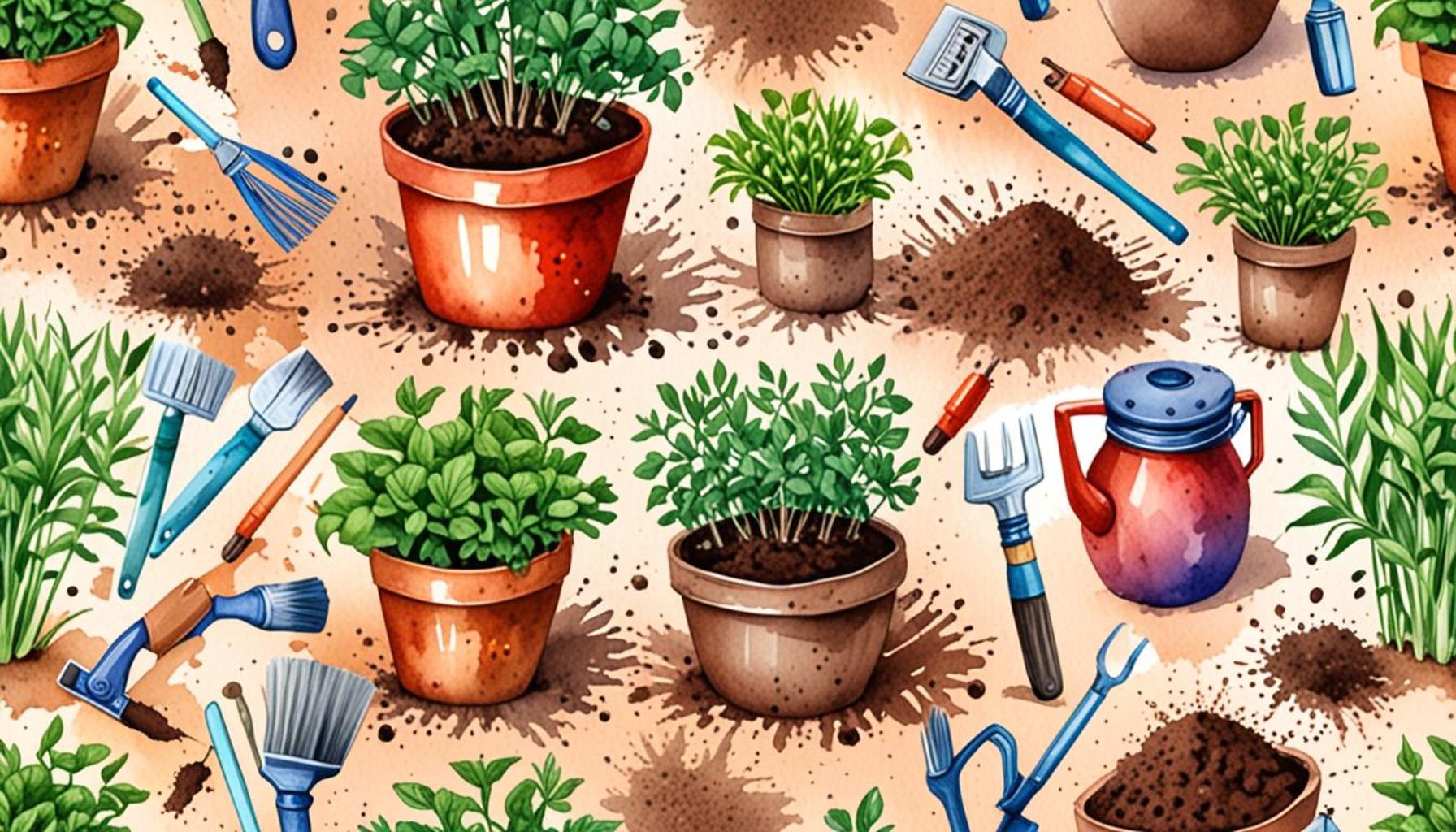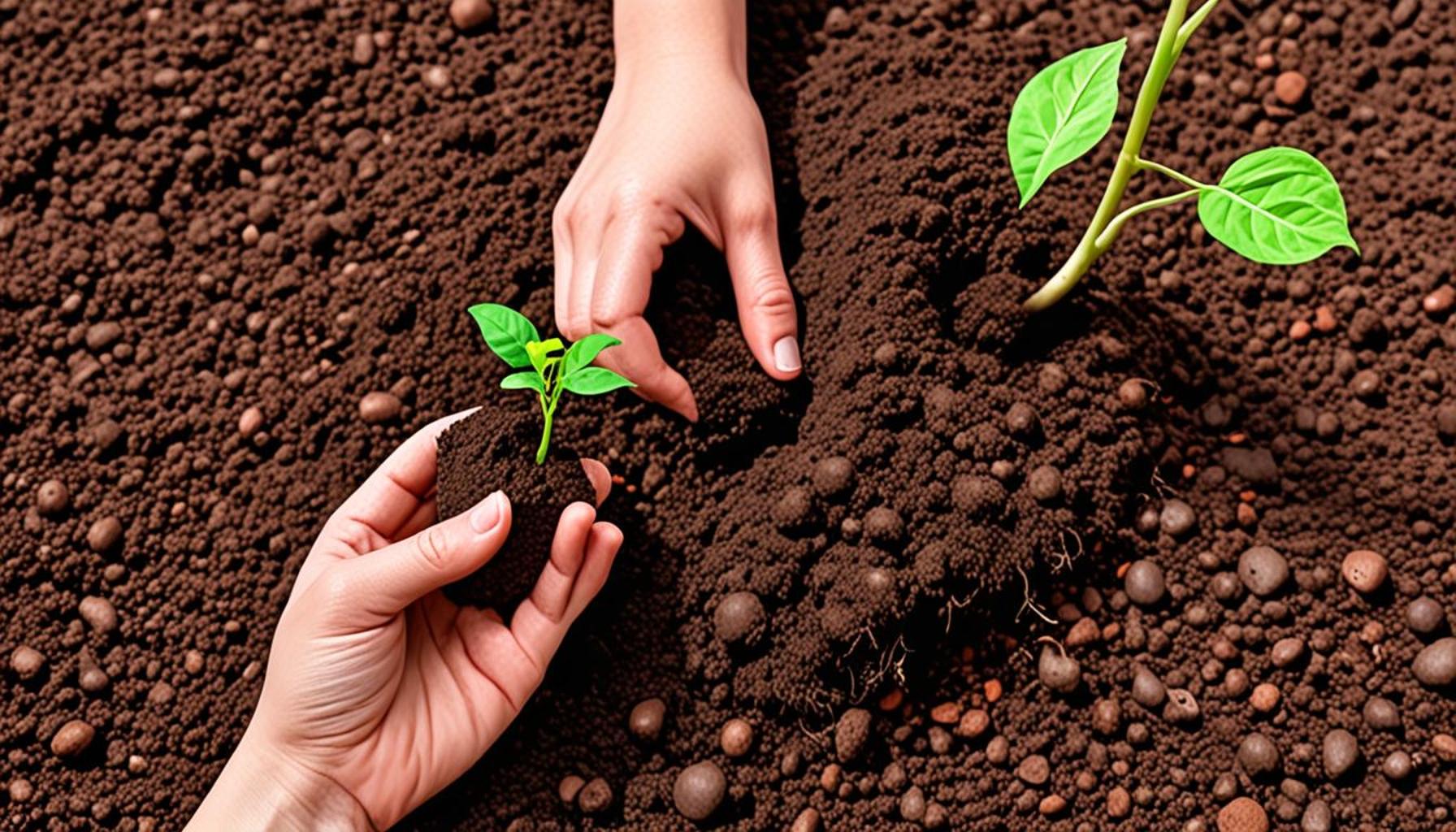The Benefits of Adding Organic Materials in Soil Preparation

Unlocking Soil’s Potential
Soil is more than just dirt; it is a living ecosystem crucial for healthy plant growth. One way to enhance this ecosystem is by adding organic materials during soil preparation. This practice offers numerous benefits that can lead to more productive gardens and farms. By understanding how organic materials improve soil health, gardeners and farmers can adapt their practices to yield better outcomes and foster sustainable agricultural habits.
Why Consider Organic Materials?
Incorporating organic materials into your soil can:
- Improve soil structure – Organic materials, such as compost and well-rotted manure, create a crumbly texture that enhances aeration and drainage. This improved structure allows roots to penetrate deeper into the soil, promoting robust plant growth.
- Boost nutrient retention – Organic amendments increase the cation exchange capacity of the soil, which helps in holding onto vital nutrients like nitrogen, phosphorus, and potassium. For instance, when gardeners use compost, they provide a slow-release nutrient source that feeds plants over time, reducing the need for synthetic fertilizers.
- Encourage beneficial microbes – The introduction of organic materials fosters a thriving micro-ecosystem. Microorganisms such as bacteria, fungi, and earthworms break down organic matter, releasing nutrients while improving organic matter levels. Healthy microbial life is crucial for processes like nitrogen fixation and disease suppression.
In the United States, the use of organic amendments like compost, manure, and cover crops is becoming increasingly popular among gardeners and farmers alike. This shift not only supports sustainable agriculture but also reduces dependency on chemical fertilizers. According to the USDA, about 3 million acres of farmland in the U.S. are now classified as organic, showcasing a growing recognition of the benefits associated with organic farming.
A Closer Look at the Impact
Research shows that fields enriched with organic materials tend to yield higher outputs and healthier plants. For example, studies conducted in California demonstrated that tomato plants grown in organic-rich soil produced up to 20% higher yields compared to those grown in conventional soils. Furthermore, these practices can enhance the soil’s ability to retain moisture, which is critical in drought-prone areas. This moisture retention reduces the frequency and quantity of irrigation needed, a key consideration in regions like the Southwest, where water scarcity is a pressing challenge.
As the conversation around soil health expands, understanding the full scope of adding organic materials becomes essential. This journey will reveal how improving soil can transform your gardening and farming experience. Farmers who adopt these sustainable practices are not only contributing to their immediate environment but are also participating in a broader movement that prioritizes ecological health and resilience against climate change. By embracing organic matter, we can unlock the full potential of our soils, ensuring they continue to support vibrant plant life for generations to come.
DISCOVER MORE: Click here to learn the best practices for harvesting fresh herbs at home
Nurturing the Foundation of Plant Life
The inclusion of organic materials in soil preparation is not just a passing trend; it is a fundamental practice that can lead to extraordinary changes in soil health and, by extension, plant productivity. As gardeners and farmers seek ways to enhance their soil, understanding the mechanisms at play becomes pivotal. Organic materials, ranging from compost and leaf litter to green manures and worm castings, can significantly impact the overall quality of the soil bed, paving the way for thriving vegetation.
Key Benefits of Organic Material in Soil
Integrating organic materials into your soil preparation routine yields several notable benefits:
- Enhancing Microbial Diversity – The introduction of organic matter creates an environment conducive to a diverse range of microorganisms. These tiny organisms play essential roles in breaking down nutrients, enhancing nutrient availability, and enhancing the overall soil health. Healthy soil teems with beneficial bacteria and fungi, which establish symbiotic relationships with plant roots, ultimately contributing to increased resilience against pests and diseases.
- Improving Soil Fertility – Organic materials serve as a natural source of nutrients that can be gradually released as they decompose. Unlike synthetic fertilizers, which often lead to nutrient leaching and soil degradation, organic amendments contribute to sustainable fertility. For instance, organic mulch not only enriches the soil as it breaks down but also prevents erosion, helping maintain nutrient levels necessary for crops to flourish.
- Promoting Climate Resilience – Soils enriched with organic materials have a greater capacity for sequestering carbon. This process not only helps mitigate climate change but also enhances soil moisture retention capabilities. In regions where irrigation is a significant concern, such as the Midwest during drought seasons, soils with higher organic matter content can retain water more effectively, reducing the need for frequent watering.
Incorporating organic materials into soil preparation is becoming increasingly recognized within the agricultural community in the United States. According to recent data from the USDA, an impressive 85% of organic farms report improved soil quality following the use of organic amendments. This trend not only aids in enhancing crop quality but also supports biodiversity, making farms more resilient to the challenges posed by climate variability.
As more farmers and growers invest their efforts in organic soil amendments, it becomes imperative to gain a deeper understanding of soil structures, nutrient cycling, and ecological interactions. This knowledge can fuel a larger movement toward sustainable farming practices that not only promote abundant harvests but also nurture the environment. With each handful of enriched soil, there is an opportunity to unlock its full potential, leading to a more sustainable future for agriculture.
| Category | Benefits |
|---|---|
| Soil Structure Improvement | Enhancing the aeration and drainage capabilities of soil. |
| Nutrient Enrichment | Providing essential nutrients directly to plant roots. |
Adding organic materials to soil preparation has profound effects that can lead to healthier, more productive gardens and farms. One major advantage is the improvement in soil structure. Organic matter, such as compost or well-rotted manure, alters the physical properties of soil, allowing for better aeration and increased drainage. This creates a favorable environment for root penetration and overall plant health, ultimately enhancing crop yields.Moreover, organic materials act as a reservoir of nutrients. The slow decomposition process releases vital macronutrients and micronutrients that are essential for plant growth. By enriching the soil, farmers and gardeners ensure that plants have immediate access to these nutrients, promoting vigorous growth and resilience against pests and diseases. The integration of organic materials not only benefits immediate crop production but also contributes to long-term soil health, making it a sustainable practice worth exploring further.
DIVE DEEPER: Click here to learn the best practices for harvesting fresh herbs at home
Transforming Soil into a Living Ecosystem
The benefits of incorporating organic materials into soil preparation extend beyond immediate plant health; they contribute to a vibrant ecosystem that enhances not only agricultural productivity but also environmental sustainability. As our understanding of these practices deepens, it becomes clear that healthy soil is akin to a living organism, teeming with interactions that benefit the entire agricultural system.
Facilitating Water Management
One remarkable advantage of adding organic materials to soil preparation is their ability to drastically improve water management within the soil. Organic matter is particularly effective at increasing the soil’s water-holding capacity, which is a vital consideration for agricultural practices, especially in temperate climates like those found in the U.S. Midwest. Studies have shown that soils rich in organic matter can increase their water retention by as much as 20% to 30% compared to standard soils. This is crucial for regions experiencing drought or irregular rainfall patterns, as it reduces the reliance on irrigation and enables crops to sustain themselves even in challenging weather conditions.
Enhancing Soil Structure
Another significant benefit of organic materials is their role in improving soil structure. When organic matter decomposes, it creates a framework of soil aggregates that allow for improved aeration and drainage. This structure not only helps the roots of plants access essential nutrients and oxygen but also promotes the movement of water through the soil profile. Research indicates that well-structured soils can significantly reduce surface runoff, thereby minimizing soil erosion while enhancing nutrient retention.
Bioremediation Potential
Organic amendments also show promise in the field of bioremediation, where they can aid in the detoxification of contaminated soils. For instance, when organic materials like compost are applied to soils afflicted by heavy metals or pesticides, they can facilitate microbial activity that breaks down harmful substances. This process not only cleanses the soil but also revitalizes it, allowing plants to thrive in previously uninhabitable plots. The USDA has documented successful bioremediation efforts in urban agriculture settings, highlighting how integrating organic materials can restore degraded lands to productivity.
Cultivating Biodiversity
The addition of organic materials fosters a habitat for various soil organisms, thus enhancing biodiversity at the microscopic level. This diversity is not merely beneficial but essential for a well-functioning ecosystem. Diverse microbial populations contribute to nutrient cycling, organic matter decomposition, and pest control, creating a balanced environment that can adapt to changes in conditions. An example of this is the use of cover crops, such as clover or vetch, which not only add organic matter but also provide habitat for beneficial insects and other biota, laying the groundwork for a resilient agricultural ecosystem.
Overall, as the agricultural community in the United States embraces organic soil amendments, it is becoming increasingly evident that these practices yield far-reaching benefits, from water conservation to improved nutrient cycling and soil health. Through careful incorporation of organic materials into soil preparation, farmers and gardeners alike have the power to drive impactful change in their ecosystems, leading to sustainable agricultural practices that benefit both the economy and the environment.
DISCOVER MORE: Click here to learn about the best harvesting techniques
Conclusion: Embracing Organic Practices for a Sustainable Future
In summary, incorporating organic materials into soil preparation is not merely an agricultural trend; it represents a monumental leap towards sustainable farming practices that promise to reshape our food systems. By enhancing water retention, improving soil structure, and fostering biodiversity, organic amendments address crucial challenges faced by modern agriculture. As we’ve seen, soils enriched with organic matter not only support healthier crops but also play a vital role in mitigating climate change impacts and combating soil degradation.
Moreover, the potential for bioremediation of contaminated soils underscores the transformative capacity of organic practices. As communities across the United States begin to realize that nurturing the soil equates to nurturing our health and environment, we see a shift towards a more holistic understanding of agriculture. From the urban gardens in cities to spacious farmlands, the application of organic materials cultivates resilience against unpredictable weather and environmental challenges.
As we look towards the future, it is imperative to continue investing in research and education that showcases the remarkable benefits of organic materials in soil preparation. Engaging farmers, gardeners, and policy-makers will ensure that we build a sustainable foundation for food production that is both productive and ecologically sound. Ultimately, the choice to enrich our soils not only yields immediate agricultural rewards but also paves the way for a thriving, biodiverse ecosystem that can endure for generations to come.


